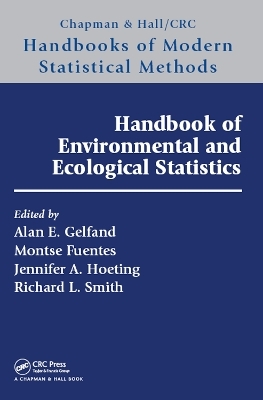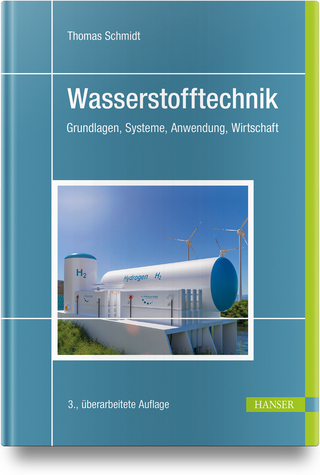
Handbook of Environmental and Ecological Statistics
Chapman & Hall/CRC (Verlag)
978-1-4987-5202-2 (ISBN)
Features:
An internationally regarded editorial team.
A distinguished collection of contributors.
A thoroughly contemporary treatment of a substantial interdisciplinary interface.
Written to engage both statisticians as well as quantitative environmental researchers.
34 chapters covering methodology, ecological processes, environmental exposure, and statistical methods in climate science.
Alan E. Gelfand is the James B. Duke Professor of Statistical Science at Duke University. He is a leader in Bayesian spatial modeling and analysis including a successful book in this area with Banerjee and Carlin. Montserrat (Montse) Fuentes, Ph.D., became dean of the Virginia Commonwealth University College of Humanities and Sciences on July 1, 2016. She came to VCU from North Carolina State University, where she served as the head of the Department of Statistics and James M. Goodnight Distinguished Professor of Statistics. She also served as center director for the Research Network for Statistical Methods for Atmospheric and Oceanic Sciences, a research collaborative funded by the National Science Foundation. She received a dual bachelor’s degree in mathematics and music (piano) from the University of Valladolid in Spain and a Ph.D. in statistics from the University of Chicago. Jennifer A. Hoeting is a Professor of Statistics at Colorado State University, where she has worked since 1994. She received her PhD from the University of Washington. Richard L. Smith is Mark L. Reed III Distinguished Professor of Statistics and Professor of Biostatistics in the University of North Carolina, Chapel Hill. From 2010-2017 he was also Director of the Statistical and Applied Mathematical Sciences Institute, a Mathematical Sciences Institute supported by the National Science Foundation, and he will continue (through June 2018) as Associate Director of SAMSI. He obtained his PhD from Cornell University and previously held academic positions at Imperial College (London), the University of Surrey (Guildford, England) and Cambridge University. His main research interest is environmental statistics and associated areas of methodological research such as spatial statistics, time series analysis and extreme value theory. He is particularly interested in statistical aspects of climate change research, and in air pollution including its health effects. He is a Fellow of the American Statistical Association and the Institute of Mathematical Statistics, an Elected Member of the International Statistical Institute, and has won the Guy Medal in Silver of the Royal Statistical Society, and the Distinguished Achievement Medal of the Section on Statistics and the Environment, American Statistical Association. In 2004 he was the J. Stuart Hunter Lecturer of The International Environmetrics Society (TIES). He is also a Chartered Statistician of the Royal Statistical Society.
Introduction. Methodology for Statistical Analysis of Environmental Processes. Basics of modeling for environmental processes. Time series methodology. Dynamic models. Geostatistical modeling for environmental processes. Point patterns. Data fusion. Analysis of Extremes. Environmental sampling methods. Zero-inflation modeling and hurdle models. Ordination methods. Topics in Ecological Processes. Species distribution models – Plants. Species distribution models - Animals. Demography. Modeling traits. Ecology of infectious diseases. Wildfires and fire recovery. Modeling of streams. Topics in Environmental Exposure. Modeling environmental contaminants. Data fusion for exposure. Modeling other exposures and modeling personal exposure. Preferential sampling with regard to exposure levels. Dynamic source apportionment. Dynamics of environmental epidemiology. Connecting exposure to outcome. Experimental design for environmental epidemiology. Topics in Climatology. Trends in climatology. Climate models. Spatial analysis for climatology. Remote sensing - the statistical contribution. Data assimilation. Spatial extremes with application to climate and environmental exposure. Paleoclimate and paleoecology. Detection and attribution. Effects of climate change on health effects.
| Erscheinungsdatum | 05.11.2018 |
|---|---|
| Reihe/Serie | Chapman & Hall/CRC Handbooks of Modern Statistical Methods |
| Zusatzinfo | 100 Illustrations, black and white |
| Sprache | englisch |
| Maße | 178 x 254 mm |
| Gewicht | 1872 g |
| Themenwelt | Naturwissenschaften ► Biologie ► Ökologie / Naturschutz |
| Naturwissenschaften ► Geowissenschaften ► Geologie | |
| Sozialwissenschaften ► Soziologie ► Empirische Sozialforschung | |
| Technik ► Umwelttechnik / Biotechnologie | |
| Wirtschaft ► Volkswirtschaftslehre | |
| ISBN-10 | 1-4987-5202-0 / 1498752020 |
| ISBN-13 | 978-1-4987-5202-2 / 9781498752022 |
| Zustand | Neuware |
| Informationen gemäß Produktsicherheitsverordnung (GPSR) | |
| Haben Sie eine Frage zum Produkt? |
aus dem Bereich


